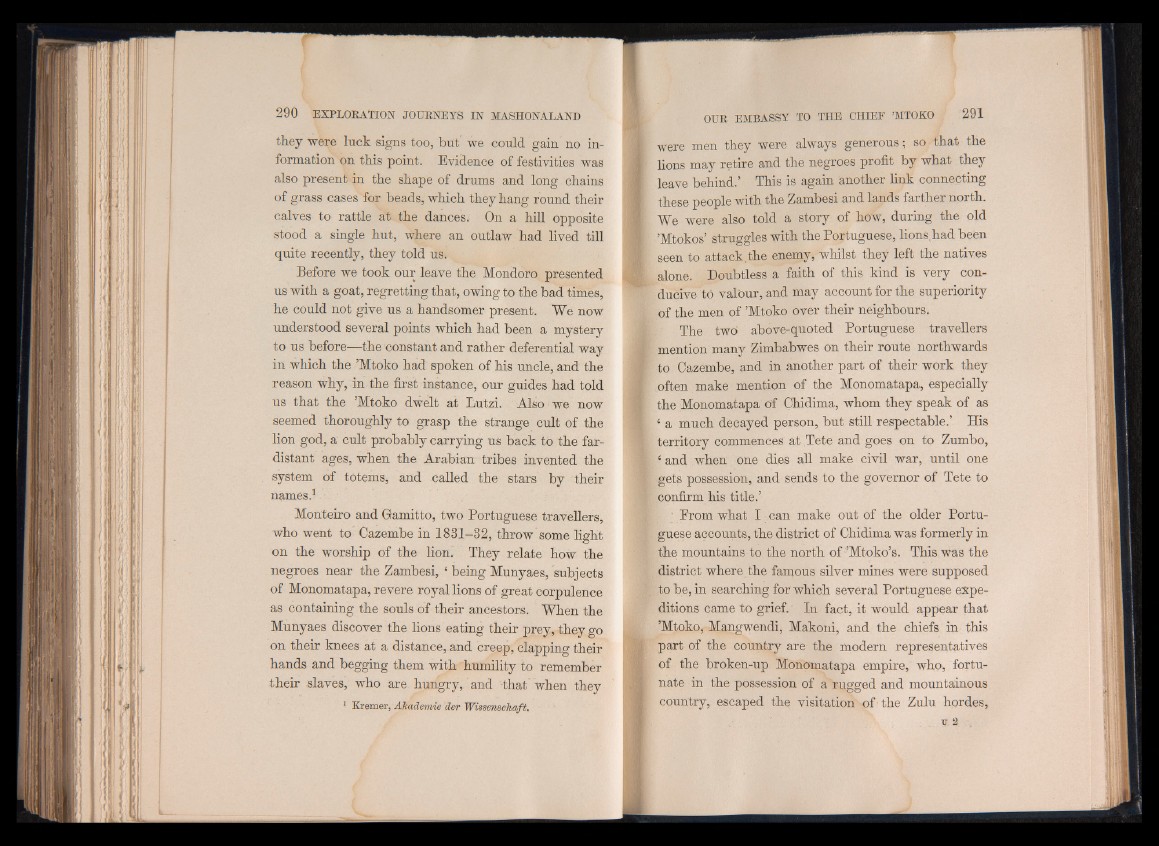
they were luck signs too, hut' we could gain no information
on this point. Evidence of festivities was
also present in the shape of drums and long chains
of grass cases for beads, which they hang round their
calves to rattle at the dances. On a hill opposite
stood a single hut, where an outlaw had lived till
quite recently, they told us.
Before we took our leave the Mondoro presented
us with a goat, regretting that, owing to the bad times,
he could not give us a handsomer present. We now
understood several points which had been a mystery
to us before—the constant and rather deferential way
in which the ’Mtoko had spoken of his uncle, and the
reason why, in the first instance, our guides had told
us that the ’Mtoko dwelt at Lutzi. Also we now
seemed thoroughly to grasp the strange cult of the
lion god, a cult probably carrying us back to the far-
distant ages, when the Arabian tribes invented the
system of totems, and called the stars by their
names.1
Monteiro and Gamitto, two Portuguese travellers,
who went to’ Cazembe in 1831-32, throw some light
on the worship of the lion.’ They relate how the
negroes near the Zambesi, ‘ being Munyaes, subjects
of Monomatapa, revere royal lions of great corpulence
as containing the souls of their ancestors. When the
Munyaes discover the lions eating their prey, they go
on their knees at a distance, and creep, clapping their
hands and begging them with humility to remember
their slaves, who are hungry, and that when they
1 Kremer, Akademie der Wissemchaft.
were men they were always generous; so that the
lions may retire and the negroes profit by what they
leave behind.’ This is again another link connecting
these people with the Zambesi and lands farther north.
We were also told a story of how, during the old
’Mtokos’ struggles with the Portuguese, lions.had been
seen to attack.the enemy, whilst they left the natives
alone. Doubtless a faith of this kind is very conducive
tb valour, and may account for the superiority
of the men of ’Mtoko over their neighbours.
The two above-quoted Portuguese travellers
mention many Zimbabwes on their route northwards
to Cazembe, and in another part of their work they
often make mention of the Monomatapa, especially
the Monomatapa of Chidima, whom they speak of as
‘ a much decayed person, but still respectable.’ His
territory commences at Tete and goes on to Zumbo,
* and when one dies all make civil war, until one
gets possession, and sends to the governor of Tete to
confirm his title.’
■ Prom what I can make out of the older Portuguese
accounts, the district of Chidima was formerly in
the mountains to the north of ’Mtoko’s. This was the
district where the famous silver mines were supposed
to be, in searching for which several Portuguese expeditions
came to grief. In fact, it would appear that
’Mtoko, Mangwendi, Makoni, and the chiefs in this
part of the country are the modern representatives
of the broken-up Monomatapa empire, who* fortunate
in the possession of a rugged and mountainous
country, escaped the visitation of the Zulu hordes,